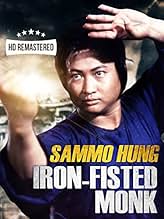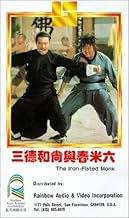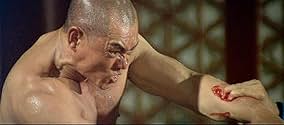IMDb RATING
6.6/10
1.1K
YOUR RATING
A lowly restaurant worker aims to take revenge on the Manchurian thugs who killed his boss by joining a Shaolin temple under the advise from a monk who rescued him from certain death.A lowly restaurant worker aims to take revenge on the Manchurian thugs who killed his boss by joining a Shaolin temple under the advise from a monk who rescued him from certain death.A lowly restaurant worker aims to take revenge on the Manchurian thugs who killed his boss by joining a Shaolin temple under the advise from a monk who rescued him from certain death.
- Director
- Writers
- Stars
Fung Hak-On
- Official
- (as Hark-On Fung)
Ho Wang
- Shaolin disciple
- (as Casanova Wong)
- Director
- Writers
- All cast & crew
- Production, box office & more at IMDbPro
Featured reviews
8Azzy
This movie happens to be the first directorial effort by Sammo Hung. It certainly doesn't do to badly. It starts off decently, and the learning curve is very sharp. Each fight in the movie is more surely Choreographed and is faster than the ones that preceded it. There is a prevelance of armed combat and acrobatics (non-wire) which are all well done. Sammo is as young as you'll see him in any movie except ENTER THE DRAGON. There is however an annoyingly large amount of nudity in this movie. The plot has Sammo training as a civilian in a shaolin temple in order to avenge the death of a neighbor at the hands of some manchu thugs. He has improved to the point of teaching classes to other non-monks at the temple. He decides to head out after the manchus, after his skills have reached a certain level. he is assisted by the brother of another victim of the manchu's, and his instructor, who is the title character. Sammo and the monk are both extremely fast and athletic, doing some impressive back flips and leaps. give it a try if you run across it.
Sammo stars as a man who is learning kung fu so that he can fight the Manchus. The directing from Sammo is good, the camera-work is brilliant, the story is decent, and the fights are very good for 1977. Fung Hak-on plays the main villain, and Yen Shi Kwan and Chien Yuet San play his top 2 henchmen. Always nice to see those 3 in action. Chen Sing has a small role and unfortunately he doesn't get to show off his handwork as much as he usually does. But he's still a great actor so I liked his role. If you have seen most of Sammo's movies and are looking for something else to feed your Sammo craving, then give this a try.
Picture and sound quality on the 20th century Fox DVD are good.
Picture and sound quality on the 20th century Fox DVD are good.
TW: Descriptions of sexual assault.
'The Iron-Fisted Monk (1977)' is Sammo Hung's directorial debut. It tells the story of a man who leaves his training at the Shaolin temple early so he can seek revenge on the Manchu bannermen who hurt his uncle. That's the setup, at least. The majority of the movie actually focuses on a group of dye workers who come into conflict with the aforementioned bannermen, as well as one in particular who seeks his own revenge after his sister is raped, and sees its main character (who isn't the eponymous monk) become involved with their plight as part of his own journey. It's a darker film than most of Hung's others, but it still has a fluctuating tone and several comedic moments sprinkled throughout its relatively brisk runtime. However, the problem with this is that - unlike with some other movies in the genre which manage to balance humour with heft - its comedy directly clashes with its more serious, sometimes downright upsetting elements and feels really out of place. In fact, the humour almost comes across as downright disrespectful, especially in the wake of a truly horrific rape scene that's way more graphic than it needs to be. Hung simply refuses to cut away from the assault, forcing us to watch it through to its completion. The scene is clearly meant to make us hate the antagonist (literally credited as just "rapist bandit"), but it definitely didn't need to be as overt as it is. It leaves a sour taste in the mouth, for sure, and it actively dampens the impact of the overall affair.
In general, Hung's direction is confident and considered. For a lot of the affair, it's dependable but unremarkable. In the climax, though, his skills behind the camera really become apparent, alongside his skills in front of it. The finale, which is easily the best part of the picture, features two heroes against many villains, and the camera makes a point of flowing between both of them evenly. Unlike in similar films with simultaneous fights (including the generally superior The Magnificent Butcher (1979)), the set-piece manages to make it feel as though both are actually occurring at the same time. The fighters don't just pause when they're off-screen, as indicated by the purposeful jumps in choreography when the camera returns to one battle or the other, and there are some shots which have both sets of combatants in the frame, establishing the scene's geography and making the composition more interesting by pulling focus from foreground to background when necessary. It all culminates in a two-on-two segment which keeps all four fighters in frame and has them seamlessly swap between foes on occasion, creating a complex ballet of blows that's exciting to behold. The marriage of choreography and camera work is what makes Hung's debut truly stand out, marking the finale as an entertaining and well-crafted slice of action cinema that encompasses everything you think of when these creators first come to mind.
It's a shame the rest of the film doesn't live up to this segment. Rape scene notwithstanding, the plot is relatively ambling and not all that engaging. A loose narrative is common within the genre, but it's more noticeable here because this picture's comedy falls so short (you don't feel like you should be laughing at it, and it's not funny enough to break through that barrier). Plus, its story is really generic and its characters aren't all that interesting. Still, it's typically engaging enough to keep you watching and its action is always enjoyable. Its brutality is disarming on occasion, even if it's way too unpleasant at certain points, and it's always a joy to watch Hung do what he's best at. It's not a bad effort overall, and the fact that Hung would go on to direct some certifiable classics using lessons learned while making it certainly makes up for its shortcomings. Its finale truly is fantastic, too. It's not Hung's best, but it's a decent experience that's almost worth watching for its climax alone.
'The Iron-Fisted Monk (1977)' is Sammo Hung's directorial debut. It tells the story of a man who leaves his training at the Shaolin temple early so he can seek revenge on the Manchu bannermen who hurt his uncle. That's the setup, at least. The majority of the movie actually focuses on a group of dye workers who come into conflict with the aforementioned bannermen, as well as one in particular who seeks his own revenge after his sister is raped, and sees its main character (who isn't the eponymous monk) become involved with their plight as part of his own journey. It's a darker film than most of Hung's others, but it still has a fluctuating tone and several comedic moments sprinkled throughout its relatively brisk runtime. However, the problem with this is that - unlike with some other movies in the genre which manage to balance humour with heft - its comedy directly clashes with its more serious, sometimes downright upsetting elements and feels really out of place. In fact, the humour almost comes across as downright disrespectful, especially in the wake of a truly horrific rape scene that's way more graphic than it needs to be. Hung simply refuses to cut away from the assault, forcing us to watch it through to its completion. The scene is clearly meant to make us hate the antagonist (literally credited as just "rapist bandit"), but it definitely didn't need to be as overt as it is. It leaves a sour taste in the mouth, for sure, and it actively dampens the impact of the overall affair.
In general, Hung's direction is confident and considered. For a lot of the affair, it's dependable but unremarkable. In the climax, though, his skills behind the camera really become apparent, alongside his skills in front of it. The finale, which is easily the best part of the picture, features two heroes against many villains, and the camera makes a point of flowing between both of them evenly. Unlike in similar films with simultaneous fights (including the generally superior The Magnificent Butcher (1979)), the set-piece manages to make it feel as though both are actually occurring at the same time. The fighters don't just pause when they're off-screen, as indicated by the purposeful jumps in choreography when the camera returns to one battle or the other, and there are some shots which have both sets of combatants in the frame, establishing the scene's geography and making the composition more interesting by pulling focus from foreground to background when necessary. It all culminates in a two-on-two segment which keeps all four fighters in frame and has them seamlessly swap between foes on occasion, creating a complex ballet of blows that's exciting to behold. The marriage of choreography and camera work is what makes Hung's debut truly stand out, marking the finale as an entertaining and well-crafted slice of action cinema that encompasses everything you think of when these creators first come to mind.
It's a shame the rest of the film doesn't live up to this segment. Rape scene notwithstanding, the plot is relatively ambling and not all that engaging. A loose narrative is common within the genre, but it's more noticeable here because this picture's comedy falls so short (you don't feel like you should be laughing at it, and it's not funny enough to break through that barrier). Plus, its story is really generic and its characters aren't all that interesting. Still, it's typically engaging enough to keep you watching and its action is always enjoyable. Its brutality is disarming on occasion, even if it's way too unpleasant at certain points, and it's always a joy to watch Hung do what he's best at. It's not a bad effort overall, and the fact that Hung would go on to direct some certifiable classics using lessons learned while making it certainly makes up for its shortcomings. Its finale truly is fantastic, too. It's not Hung's best, but it's a decent experience that's almost worth watching for its climax alone.
Breaking barriers and setting new standards in on-screen fight choreography, Sammo's directorial debut is a must for any chop socky aficionado, and although not his best work (a warm up to Warriors Two), it can easily stand proudly amongst them. It's hodgepodge of a story acts as a boiling pot of escalating annihilation, until exploding in a fury of that unique fast and colourful Sammo choreography that we just love so much. Centring on the real-life legend of 'Miller Six' (Sammo), Iron Fisted Monk is driven by a powerful anti-Manchu narrative that feels relentless in its onslaught (they rape, kill, maim and pillage, not to mention bully little kiddies). Miller Six's uncle is killed, he learns the martial arts at the local Shaolin temple, and then off he goes for vengeance. And it's really as simple as that. This is a great movie - well choreographed (by Sammo), well directed (by Sammo) and with some great performances (especially that scoundrel Fung Hark-on who's simply irresistible as a downright evil Manchu warlord).
Sammo's directorial debut is a mixed bag with some great fight scenes, decent comedy, and unpleasant scenes of violence. The plot, which rolls along almost painfully a times, centers around Husker (Sammo Hung) seeking revenge against the Machus for killing his uncle. Along the way to actually taking revenge he befriends a man who's daughter is raped by the local Manchu official and ultimately enlists in the aid of his wandering monk friend, Brother Tak, to take on the Manchus. The plot changes direction so many times that one has to wonder if it was made up as they went along. There are a couple rape scenes midway through the movie that are unnecessarily explicit and go on much too long. As the movie progresses though we are treated to some decent martial arts sequence, which are not as elaborate as Sammo's later works, but fast paced and solid none the less. Worth watching for the fight sequences, but sitting through the plot might turn you off of the movie before you get to them.
Did you know
- TriviaAfter the success of Si da men pai (1977), Sammo Kam-Bo Hung's first starring role, Sammo asked a producer working at Golden Harvest if he could direct a movie, he agreed and wrote the script for Hung, while Hung directed and starred in the movie.
- Alternate versionsAlthough the UK DVD version from Hong Kong Legends suffered the cutting of a sexual assault scene, the 2019 UK Blu-Ray version is uncut and has that scene restored.
- How long is Iron Fisted Monk?Powered by Alexa
Details
- Release date
- Country of origin
- Language
- Also known as
- Le moine d'acier
- See more company credits at IMDbPro
Contribute to this page
Suggest an edit or add missing content

Top Gap
By what name was San De huo shang yu Chong Mi Liu (1977) officially released in India in English?
Answer





































